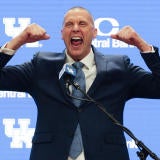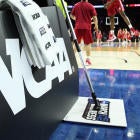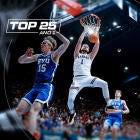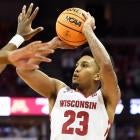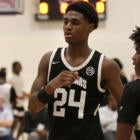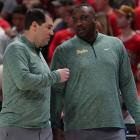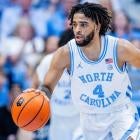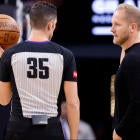In one violent, backhanded slap, Condoleezza Rice took down an unfair, hurtful and borderline unethical institution.
No, not the NCAA itself but rather what the NCAA represents.
If you've never been with 500 miles of Indianapolis, you still know the association by its most infamous byproduct: the enforcement process. We're talking that cadre of NCAA investigators and an all-volunteer infractions committee that hands out penalties.
Rice and her Commission on College Basketball reformers called for a complete overhaul of a system that turns 67-years-old this year. Enforcement has existed since 1951 because there were too many cheaters then; well, there are too many cheaters now. The only difference over seven decades is the level of sophistication.
In its history, there have been few winners in the enforcement process. It is/was criticized -- reviled at times -- for its clumsy, overbearing procedures. Innocent people were condemned, charges were trumped up.
In one landmark case, the infractions committee didn't know academic fraud when it was two inches from its face. Like it or not, enforcement was the NCAA's front porch, its brand, its reputation.
That reputation was almost never good. Schools might express remorse for wrongdoing, but they muttered on their way out of the conference room every time.
Think about it: Have you ever heard a school celebrate a fair penalty? It always -- always -- an adversarial process between peers. That's more than uncomfortable.
It took decades for investigators to be able to use tape recorders to back up the testimony they were using to convict schools. Cases took so long to process that the NCAA eventually launched a website to explain the delay.
Anecdotally, I have heard of at least one infractions chair who fell asleep during a hearing.
Rice and the commission she chaired took a baseball bat to that model on Wednesday. It was the most significant bullet point to come out of reforms.
As part of its basketball reform package, the commission recommended "prompt radical transformation" of that process.
It's tragic on another level for a group of this substance to admit that "the consensus view -- including within the NCAA -- is that the NCAA investigative and enforcement process is broken."
The commission recommended complex, high-level cases be reviewed by a panel of paid independent decision makers (think retired judges and lawyers). They would operate under the American Arbitration Association rules.
That would replace the current model where committee members face "perceived conflicts of interests" and lack "credibility of the process."
"Punishment," the commission's report said, "is often unpredictable and inadequate to deter violations. … Volunteers and members should not decide whether member institutions have violated NCAA rules."
There would also be enhanced coaches' responsibility penalties. The bylaw has existed since 2013. You might have noticed big names like Jim Boeheim, Rick Pitino and Hugh Freeze have been given suspensions.
But have those suspensions been enough of a punishment? The commission concluded that many schools still believe "rewards outweigh the risks."
The best part is this is not just a basketball thing. This has to be for all sports, including football, which has its own set of problems.
The commission took a direct shot at the North Carolina decision. Going forward, the NCAA should clearly define academic fraud, it says. No more excuses like sham courses being available to "the entire student body."
The new model comes as close to instituting subpoena power as possible. Schools, presidents and coaches would have to promise to cooperate with investigators as a condition of playing Division I basketball. There would be contractual agreements to ensure as much.
Am I the only one who reads instituting "professional investigation" as hiring private investigators? (For the record, media weren't immediately allowed to ask follow up questions after the commission's announcement.)
This is enlightening, progressive stuff, especially for anyone who has faced the process. Former USC running backs coach Todd McNair sits in a Los Angeles courtroom this week because of that process.
Almost eight years after he was cited for unethical conduct in the Reggie Bush case, McNair is getting his day in court suing the NCAA for defamation. It is a case that at least one infractions committee member admitted was botched has kept McNair from working in college football since USC didn't renew his contract.
Let's be honest: McNair has been blackballed. In what has to be some sort of cosmic karma, the NCAA is defending an enforcement system the commission just trashed in front of a judge who graduated from USC.
A favorable verdict for McNair could cost the NCAA eight figures -- and more of its reputation.
All of it is long overdue. What the commission recommended regarding enforcement is essentially what the Pac-12, Big 12 and Big East have endorsed in recent months.
The membership has been fed up for a while. It's tragic that an independent body was needed to recommend another independent body to adjudicate cases.
That's not to say the commission's report was perfect. Far from it. It didn't address name, image and likeness issues, or the Olympic model. It didn't address the length of seasons or how TV rules start times. All of it has to do with student-athlete welfare.
And, truthfully, none of it really means anything unless there are real teeth to these recommendations. Troubleshooting lawyers hired by schools will still have their say.
But getting rid of the NCAA as Big Brother in enforcement cases was a start. It was a back-handed slap that truly, hopefully hurt.











